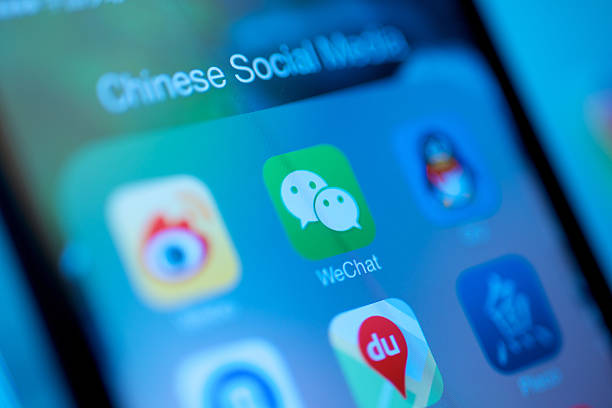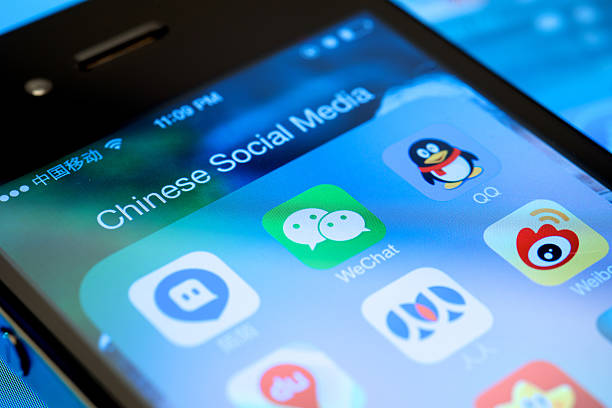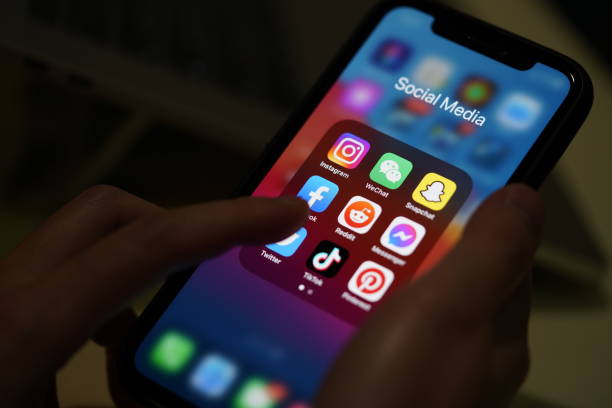This is a story about a WeChat account in Australia, which has been widely used to spread false information before the upcoming election.
This article will provide an overview of the issue and discuss its implications for the election. Additionally, it will discuss the measures the Prime Minister of Australia, Scott Morrison, has taken in response to the situation.
Background on WeChat and its use in Australia
WeChat is a Chinese-developed mobile messaging application designed for smartphones, tablets, laptops and desktop computers. Originally launched in 2011, WeChat has become one of the world’s most popular messaging apps. In Australia and other Western countries, WeChat is primarily used for text messaging and VOIP (Voice Over Internet Protocol) calls. However, unlike traditional SMS services, WeChat also has various social media features such as timelines, broadcasting messages to followers and videos and images.
In Australia, Wechat is particularly popular with China-born users who use the application to send messages to friends and family back in China with minimal cost. However, several Australian politicians have been concerned that this instant messaging tool could easily be misused to spread politically-motivated propaganda or false information. For example, there have been allegations that Chinese operatives within Australia have been utilizing WeChat accounts to spread false information regarding Australian politicians or foreign policy issues to influence public opinion.
Whether these claims are founded or not remains open for debate. Still, further research is needed to understand how state actors or propagandists can strategically manipulate WeChat within Australia to influence political discourse or outcomes.

Australia PM Morrison loses control of WeChat Chinese account as election looms
In recent days, Australian Prime Minister Scott Morrison has lost control of his WeChat account as the election is close.
For those unfamiliar with WeChat, it is a Chinese multi-purpose messaging, social media and mobile payment app used by millions of people worldwide.
This sudden loss of control of his WeChat account has caused a spread of false information with reports of Morrison’s WeChat account being used to spread misinformation.
This article will discuss the wider implications of this incident and how it might affect the upcoming elections.
How false information can spread quickly on WeChat
False information can spread quickly on WeChat, the top Chinese messaging platform. According to research conducted by a Shanghai-based security company, the most common sources of misinfo on WeChat are anonymous accounts that post articles filled with misleading information and debunked theories. These accounts can gather large followings on WeChat quickly and have wide-reaching impacts due to their ability to reach millions of people with their views.
False rumors and conspiracy theories can spread quickly on WeChat mainly because of its focus on group conversations. For example, one false allegation can get shared among dozens of groups, reaching thousands or even millions of people within a few minutes. Furthermore, users usually trust the information they find in their transmission networks and may not take the time to research further before sharing it with others.
In addition, WeChat’s “Moments” feature allows for easy sharing of articles which can lead to users quickly spreading false information without adequately verifying its accuracy. Moreover, because ideas shared from one to many spreads faster than from many to many users without any filtering process, some ideas will spiral out of control moments before verification or even being read by anyone else is possible.
Finally, although there are existing regulations against spreading false rumors online in China, they are usually ineffective at preventing misinfo from circulating widely due to enforcement challenges and rampant enforcement evasion techniques practiced by anonymous distributors. This means that misinfo formed through anonymous accounts will likely continue spreading freely unless more effective countermeasures are introduced by authorities such as implementing real-name registration for all social media users and potential punitive damages for repeat offenders who break these laws repeatedly.
Examples of false information spread on WeChat
WeChat is an increasingly popular messaging and video streaming app with over a billion monthly active users. Unfortunately, it has also been used to spread misinformation, which can take many forms. These include gossip, false news stories, shock posts, malicious hoaxes and rumors disseminated through social media networks by anonymous accounts.
Gossip: Unverified conversation or rumor shared through the app about people with no evidence to back up the claims.
False News Stories: Fabricated stories purported to be true may include misleading titles or obscured facts.
Shock Posts: Content intended to shock or provoke viewers’ extreme reactions, such as false incidents involving animals or graphic images of accidents and crimes.
Malicious Hoaxes: Deceptive messages created with malicious intent often target individuals or corporate entities without justification.
Rumors : Unsubstantiated information spread on social networks that are often linked to emotion-provoking events or topics to stoke fear or panic among users with limited factual information about the issue.

Impact of Misinformation
Australia’s Prime Minister, Scott Morrison has recently lost control of a Chinese-language WeChat account that has been used to spread false information. This incident has highlighted the impact of misinformation on public sentiment and has raised many questions about the authenticity and safety of online information.
This article will discuss the implications and dangers of false information propagated through social media platforms.
How false information can impact the election
The proliferation of misinformation has become a major concern for those preparing for upcoming elections. As the use of social media becomes more prevalent in society, we are exposed to more news sources that may not be reliable. In addition, there is now particular concern about sharing false information through WeChat, a widely used messaging application in China, where election-related information can potentially be manipulated by state-backed actors or grassroots disinformation campaigns.
Misinformation can significantly impact voting behavior and reduce participation or voting along predetermined party lines. For example, in the 2016 US Presidential Election, participants were found to be three times less likely to vote after having been exposed to false information on online platforms. This can ultimately lead to decreased exposure to dissenting points of view and less balanced electoral debates.
False information often changes the course of discussion within an election and can have reverberating effects on public perception before and after the participating parties have been elected. Moreover, people already predisposed to their beliefs are more at risk of believing false information than those from other ideological backgrounds. Therefore, platforms like WeChat must take measures for flagging fake accounts that spread false news articles during elections so as not to disrupt democratic processes around the world.

Potential risks of false information
Misinformation, either deliberate or unintentional, has various potentially harmful effects. It can be socially, politically, and/or economically damaging to individuals, communities and countries. For example, spreading false information about COVID-19 could lead to increased virus cases due to non-adherence to safety measures.
False information can also cause emotional distress. People who believe in false information can become overwhelmed with fear and anxiety as they try to make sense of contradictory messages. This can lead to dangerous behaviors that affect public health, such as refusing medical treatments or not seeking professional care.
Misinformation also has economic ramifications by damaging the trust between consumers and businesses. For example, bad press may affect businesses due to negative reports or fake reviews spread through social networks or WeChat accounts that contain inaccurate claims about their products/ services. In addition, false information regarding political issues may result in an erosion of public trust in government leaders and organizations – thereby making it harder for them to create effective policies that would benefit their constituencies.
In conclusion, false information is a real threat with potentially serious consequences for people and organizations if not kept in check. Everyone needs to recognize the risks associated with misinformation so we can take measures–such as media literacy education–to reduce its damaging effects on society.
Response from Australian PM Morrison
Australia’s Prime Minister Scott Morrison has recently expressed his displeasure with the unauthorized use of his WeChat account in China to spread false information.
This comes as a surprise with the country’s looming elections, and the Prime Minister’s response highlights the importance of maintaining accuracy and truth in the public sphere.
How the PM responded to the false information
On Monday, July 29th, Prime Minister Scott Morrison addressed the inappropriate use of personal WeChat accounts to spread false information. He noted that sharing malicious or misleading material designed to destabilize our communities “will not be tolerated in Australia” and reiterated the message that “we must combat this cancer of lying and deception with all our strength.”
In response to this incident, Prime Minister Morrison expressed that he expects greater responsibility from all Australians regarding using social media responsibly. He stated, “in an age where lies spread like wildfire, every one of us must actively counter them.” Further steps taken in response include ensuring the Australian Federal Police and other agencies can work with providers such as WeChat and TikTok, to identify those responsible for spreading false information on their platforms.
Minister for Home Affairs Peter Dutton has also announced two new measures to combat disinformation: a Code of Conduct for Social Media Platforms and an expansion of Commonwealth Security Law. These steps will create legal obligations for social media companies operating in Australia to ensure their sites are free from malicious or deceptive content. The Prime Minster concluded his statement by emphasizing the need for Australians to stand up against “lies [that] corrode trust, erode community tolerance and undermine our national unity.”
What measures were taken to address the false information
In response to false information being disseminated via a WeChat account, Australian Prime Minister Scott Morrison has indicated that the Australian government will take measures to address this issue. On March 25th 2020, he declared, “Those who attempt to spread falsehoods and untruths through the malicious use of social media platforms must not be allowed to undermine our national security.”
The Australian Government recently announced that it is in the process of creating a new tool that will enable people to quickly report false content on social media platforms such as WeChat. The tool is intended to make it easier for users to report suspicious accounts, posts or messages and provide a pathway for law enforcement agencies and governments worldwide to take appropriate action against those responsible for spreading false information.
In addition, PM Morrison targeted specific individuals who have been involved in the promoting of false information and emphasized the importance of an open internet: “We know there are those who would seek to mask their identities and intent through anonymity online…As an international community we must work together effectively with service providers and encourage them to develop technologies which disrupt malicious single-use accounts which can be used for political propaganda or terrorism”. He also praised platforms such as WeChat for their efforts so far in addressing this issue: “I commend platforms such as WeChat – which are recognised as pioneers in online safety – for taking important steps towards safeguarding users from malicious behavior online” .
Conclusion
Prime Minister Morrison’s WeChat Chinese account was used to spread false information during Australia’s federal election campaign. This account was operated without the Prime Minister’s knowledge, influence, or consent by a third-party. Although there is no evidence to suggest that it impacted the election outcome, it has certainly raised questions about WeChat’s role in election campaigns.
